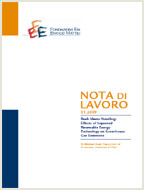Environmental Catastrophes under Time-Inconsistent Preferences

29.05.2013
Thomas Michielsen
C73, D83, Q54
Catastrophic Events, Decision Theory, Uncertainty, Time Consistency
Climate Change and Sustainable Development
Carlo Carraro
I analyze optimal natural resource use in an intergenerational model with the risk of a catastrophe. Each generation maximizes a weighted sum of discounted utility (positive) and the probability that a catastrophe will occur at any point in the future (negative). The model generates time- inconsistency as generations disagree on the relative weights on utility and catastrophe prevention. As a consequence, future generations emit too much from the current generation’s perspective and a dynamic game ensues. I consider a sequence of models. When the environmental problem is related to a scarce exhaustible resource, early generations have an in-incentive to reduce emissions in Markov equilibrium in order to enhance the ecosystem’s resilience to future emissions. When the pollutant is expected to become obsolete in the near future, early generations may however in- crease their emissions if this reduces future emissions. When polluting inputs are abundant and expected to remain essential, the catastrophe becomes a self-fulfilling prophecy and the degree of concern for catastrophe prevention has limited or even no effect on equilibrium behaviour.
